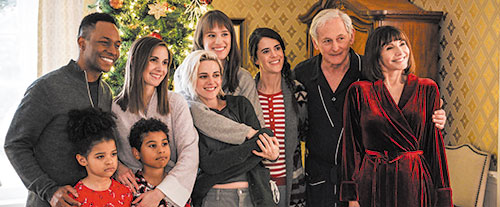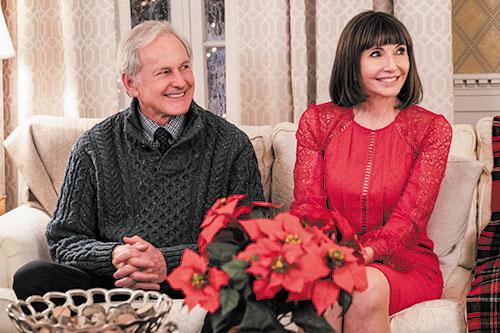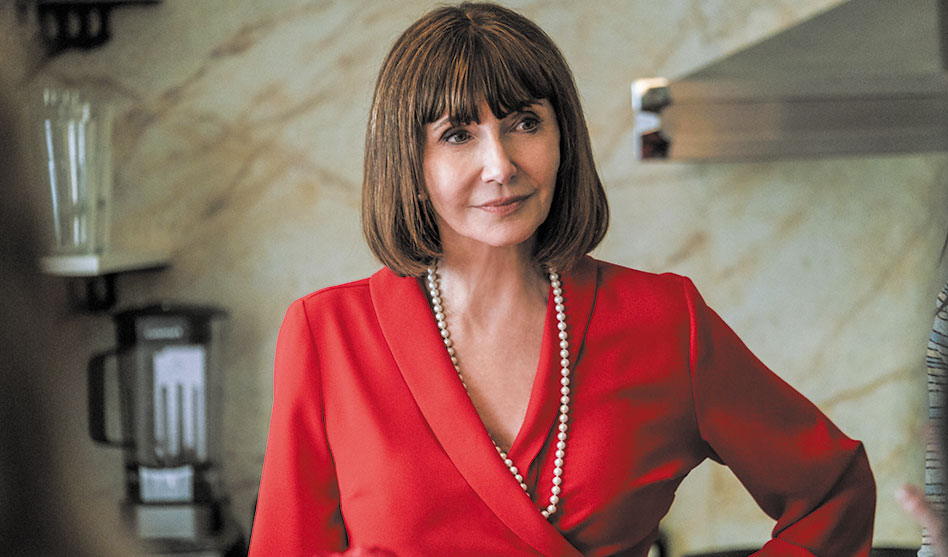An interview with actress Mary Steenburgen
Happiest Season (Hulu), written and directed by out actor Clea Duvall, is one of the queer Christmas movies that are especially popular this holiday season. Lesbian couple Abby (out actor Kristen Stewart) and Harper (Mackenzie Davis) are on their way to spend Christmas with Harper’s family. But there’s a twist, not revealed to Abby until they are almost there; Harper’s not out to her parents, Tipper (Mary Steenburgen) and politician Ted (out actor Victor Garber), or her sisters Jane (Mary Holland) and Sloane, with whom she is extremely competitive.
This closeted fact leads to all sorts of wacky shenanigans — and a touch of heartbreak. Aubrey Plaza as Harper’s ex Riley, and Dan Levy as Abby’s outspoken gay BFF John add intrigue to the story.
It’s a reminder that in 2020, even after all the progress that’s been made, there are still places and families where being queer comes at a cost. Steenburgen, who has a wonderful track record with Christmas movies, was kind enough to answer a few questions about the movie and her career.
— Gregg Shapiro
Dallas Voice: What was it about the character of Tipper in Happiest Season that made you want to portray her? Mary Steenburgen: First of all, I was attracted by the theme of the movie and the fact that there hadn’t been holiday rom-com movies that had a gay couple at the very center of the movie, as opposed to a tangential character — at least to my knowledge, especially with a big studio doing it. I felt like this is a nice thing because there are so many people that come out to their families at the holidays because it’s when people are together and the families are all there. I know it’s challenging. I thought it’s an opportunity to talk about how hard that can be, but also have fun with it, too, and really explore those themes.
And I love the fact that Clea was the one that was directing it. She wrote a very beautiful letter to me that said, “This is my favorite genre of movie, but I’ve never seen myself reflected in them.” That meant a lot to me to help her fulfill that vision.
Tipper is the mother of three daughters. You are both a mother and stepmother. How much does being a parent influence the kind of mothers you play onscreen? With my stepdaughters, we have three daughters and one son, so I’m very familiar with having a house full of daughters. I think there’s little bits of me in each of these mothers.
I think that Tipper is probably quite different than I am [laughs]. She’s really fun for me to play because she is so different from me and because my own kids would never let me get away with any of the bossiness and all that stuff that Tipper demonstrates — how she literally silences people and tells everybody what to do and where to stand and what not to say. That would never fly a single day in my family. They’re all too self-realized to put up with any of that.
That whole combination of people — Victor Garber being my partner, who’s just the funniest and kindest man, just such a sweet man, as well, to work with. From the minute we all laid eyes on each other, it was just a dream and a gift. We couldn’t have known this at the time, but it was a gift that occurred right before we all were going to go into such isolation, to have such a magical human experience, full of so much laughter on and off screen, especially off screen, we were constantly getting giggles and playing silly games.
 But [there were] also, some meaningful moments, because this was a storyline that meant something to all of us. Much of our cast is gay. Those that aren’t … have loved people so long that have had these struggles. For us to pull together and make this movie that was in many ways about an ordinary family in some ways — wealthier, certainly, than a lot of families — [that has] a lot of the issues and the little pettiness and all [those things] a lot of people experience in their family. For each of us I think it became this passion project.
But [there were] also, some meaningful moments, because this was a storyline that meant something to all of us. Much of our cast is gay. Those that aren’t … have loved people so long that have had these struggles. For us to pull together and make this movie that was in many ways about an ordinary family in some ways — wealthier, certainly, than a lot of families — [that has] a lot of the issues and the little pettiness and all [those things] a lot of people experience in their family. For each of us I think it became this passion project.
[One of the things] I love about it is that it isn’t a preachy film. People are moved by it, regardless of their sexuality. I’m proud of it. I’m proud to be one little part of it.
Entertainment Weekly recently crowned you the Christmas movie MVP from your appearances in Happiest Season, Elf, One Magic Christmas and Four Christmases. Excluding your own movies, do you have a personal favorite Christmas movie? I have to say Elf is pretty special for a Christmas movie, but you said besides my own. I do love Love Actually. That’s a favorite Christmas movie and it’s spectacular. I love [Richard Curtis’] writing. It’s written and directed so perfectly. Such spectacular actors in it. I’ve always loved it.
We’re speaking a couple of weeks before Christmas. Where does Christmas fall on your list of favorite holidays? I do love it. I’m very partial to Thanksgiving because I love food. It’s really the holiday that’s mostly about food. Any holiday that brings my family together is a holiday I love. We have a very close-knit family, and I adore every single one of them. I find them completely fascinating and hilarious.
I love that regardless of what your faith is or even if that’s something you think about, I think there is something at Christmas that challenges us all to think about being generous to others, to reach out and maybe give people a little joy. Maybe that’s why I love doing Christmas movies. It’s a way of being generous with oneself, and I like that.
Throughout your acting career you have struck a balance between comedic and dramatic roles. Do you have a preference for one over the other? Yes, I really prefer comedic [laughs]. I know that they don’t win the awards the way the dramatic ones do [laughs]. It’s not that I don’t love doing dramatic roles. But the only way I know how to do a dramatic role, which often equates to being stuff that’s challenging for that character, being sad or whatever, the only way I know how to do it is to really go there. I don’t like making myself be that sad.
I do a [TV] show called Zoe’s Extraordinary Playlist, and last season was about the illness and inevitable death of my husband, who’s brilliantly played by Peter Gallagher. It hurt my heart to do it. It’s beautiful and challenging, and I’m honored to do it. But if you really ask me which I enjoy, anyone who knows me knows that I love to laugh.
I married the funniest man in the world (Ted Danson). I have funny children. I didn’t get through a single scene in Happiest Season, except maybe the one at the very end, without breaking up. For me, doing a comedy is me at my most joyful.
You were a Best Supporting Actress Oscar and Golden Globe winner for your third movie role, as Lynda in Melvin and Howard. What did that mean to you then and what does it mean to you now? I miss my friend Jonathan Demme, who directed that movie. He was a spectacular director. It means a lot to me that I won those amazing awards for that movie. Bo Goldman, who wrote it, who also won Best Screenplay that year, wrote the most beautiful script. It was like flying to play that part. It was a true honor and I feel very blessed.
I think [winning an Oscar] causes the business to probably take you a little more seriously and to believe in you more. That’s a meaningful thing to me. This is something I’ve now done for 45 years. I treasure every single day that I’m on a set. I think anyone who’s worked with me would agree that I’m not bored or jaded or any of those things. For me, it’s still an utter privilege to do this for a living. I never forget that for a second.
 Happiest Season is also not your first LGBTQ-themed movie. In 1993, you played lawyer Belinda in the Oscar-winning Philadelphia. Do you have an awareness of a following for your work in the LGBTQ community? I would love to be a gay icon. That is something people have been writing about me lately, and that makes me really happy! I thought I won’t be because I don’t fall into the easy kind of gay icon category, but I’m working really hard at it. It’s one of my main goals in life.
Happiest Season is also not your first LGBTQ-themed movie. In 1993, you played lawyer Belinda in the Oscar-winning Philadelphia. Do you have an awareness of a following for your work in the LGBTQ community? I would love to be a gay icon. That is something people have been writing about me lately, and that makes me really happy! I thought I won’t be because I don’t fall into the easy kind of gay icon category, but I’m working really hard at it. It’s one of my main goals in life.
The thing about Philadelphia is, and I’ve talked about this before, I had an amazing experience about that movie. Two things — my friend Peter, who had been my roommate and one of my best friends and one of my acting partners in a comedy improv group I was in, died of AIDS right before I went to make that movie. I was very torn up when I went. I remember getting on the plane. I saw where my seat was, and I was seated next to this man who was very thin and gaunt. He had a sort of bandana over his head where I could see his hair had kind of been taken out by chemo or something. I thought, “Oh my God, I’m already such a wreck because of the loss of my friend, and now I’m going to sit next to someone who has AIDS on the plane, and the whole thing is going to make me even more heartbroken than I already am. He looked up at me and it was Tom Hanks, who I knew well, but I didn’t recognize him, because he had done such a commitment to play that role. He was frail.
It was so extraordinary not to immediately recognize him because of his physicality and the commitment he had already made to that character, which I thought was really something. For my part, it took a moment for me to get there with my character because I was kind of the bad guy. I was personalizing so much of what I had just been through with my friend. It was a little tricky at first for me to play that character.
The first day, which I was not good, not good at all. The one day of my acting like that I just felt like a dismal failure, Jonathan said to me, “Mary, you’re making this about AIDS. This is about justice. I want you to think about the fact that every person who hires a lawyer, whether it’s a good person or a bad person, they deserve the best defense possible because that’s how we uphold this beautiful justice system. It’s not about what you think or feel. It’s about you giving your client the best defense possible.”
From that second on, I knew how to play that character. I loved being a part of it. I loved the impact it had on people, particularly hearing from very conservative people how this film modeled for them a family that surrounded their son with love. That theme meant a lot to families at that time because it was still kind of new to even talk about being out.
You mentioned directors Clea Duval and Jonathan Demme. Do you have any interest in directing for film or television? No. [Laughs] I have much more interest in writing the theme song at the end of the movie. I write music. Last year I had the end credits song (“Glasgow”) for the movie Wild Rose that Jessie Buckley sang. That’s my happy place, to be able to write music. I don’t think I’d make a very good director. I have a son (Charlie McDowell) who’s a wonderful director. I don’t think I’d be very good at it because I get too lost inside the story, as opposed to being able to have that kind of overview of everything.
Having some kind of distance. Yes, I don’t think I’d be good at distance. My problem is I get too into it. That kind of passion for story does allow me to express myself musically. That I think I prefer.
Do you think you might have a Broadway musical in you? From your lips… [laughs]. I would love that very much. That would be a dream come true.














What a delightful interview and interview subject.